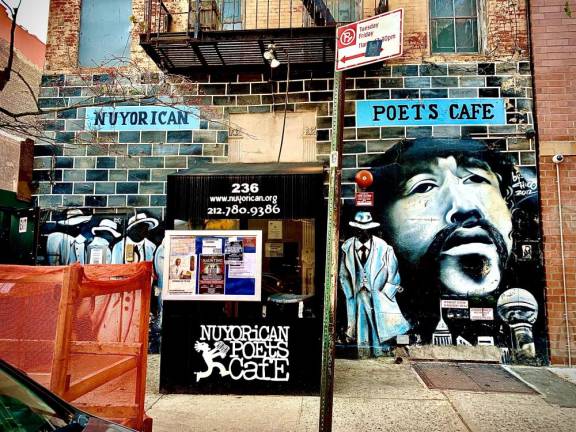The Floor is Open
It's standing room only for slams at the Nuyorican Poets Café

If you’re looking to get a seat at the poetry slams at the Nuyorican Poets Café, you better come early.
A long line had already formed outside the former tenement building in Alphabet City 20 minutes before the café’s doors opened at 10 p.m. on Friday. Inside, though, many were content to sit criss-cross applesauce on the floor in front of the hundred or so already-occupied folding chairs making up the audience. Others hunched over the balcony railing for an aerial view of the stage.
The drafty brick warehouse-like space has been packing in these crowds since 1981, but the spirit of the Nuyorican Poets Café was forged eight years earlier as a living room salon in the East Village apartment of Miguel Algarin, according the organization’s website. It was a space for poets, playwrights, and musicians of color who were not accepted by the mainstream industries to share their art.
For decades, the café has continued to be a vital place for the Latino and African-American communities of New York to showcase their work. It was clear Friday that the slams — a contest comprised of three scored rounds in which spoken word poets recite their pieces from memory — draw people from all over the city.
“Manhattan in the building?” asked Jive Poetic, the night’s emcee, conducting a borough check. His question was greeted by moderate applause.
"Now how about Harlem?” he asked, this time eliciting raucous cheers. “OK, out-of-towners, let me explain to you what just happened. Harlem is in Manhattan — it just don’t think so.”
Poetic ran through the boroughs, and “places that act like they’re boroughs,” finding representatives from Brooklyn, Queens, the Bronx, Long Island, New Jersey, Westchester and even Connecticut.
“Wait, last one — is Staten Island in the building,” he asked, getting no response other than laughter from the other boroughs. “OK, I just wanted to make sure.”
Code Switching and Police Violence
Poetic picked five volunteers from the audience to give each of the three poets a score after their three performances. He told the judges not to let him or anyone else influence their scores. He then told the rest of the audience it was their job to influence the judges.
Most of the rules were straightforward, like requiring the audience to turn their phones on silent. Some rules were not.
“I can’t I’m about to say this to grown ass people,” Poetic said. “But, if you’re in the audience, and you hear a poem you don’t like, do not tackle the poet off the stage. This happened two weeks ago.”
The poets — two women; one man — came up one by one and easily hushed the rowdy audience with their performances.
“Death is the worst kind of personal trainer,” the first performer began with a bellow, telling a story about strength, death and resurrection.
They recited poems about code switching, police violence; the pressures of being second-generation; and haunting old, unfaithful lovers.
The slam seemed to serve as a cathartic community event in being able to express and share in a space that was not white. The audience responded with snaps and “mhm’s.” The judges never gave a score below an 8.
After midnight, Jive Poetic tallied the score, noting everyone had to make the trek back to their respective boroughs, announced the winner and gave her the $20 prize, and the offer to open next week’s slam with a poem.
In the spirit of the café, Poetic opened the floor to anyone else who wanted to share.
"If you’re in the audience, and you hear a poem you don’t like, do not tackle the poet off the stage." Emcee Jive Poetic